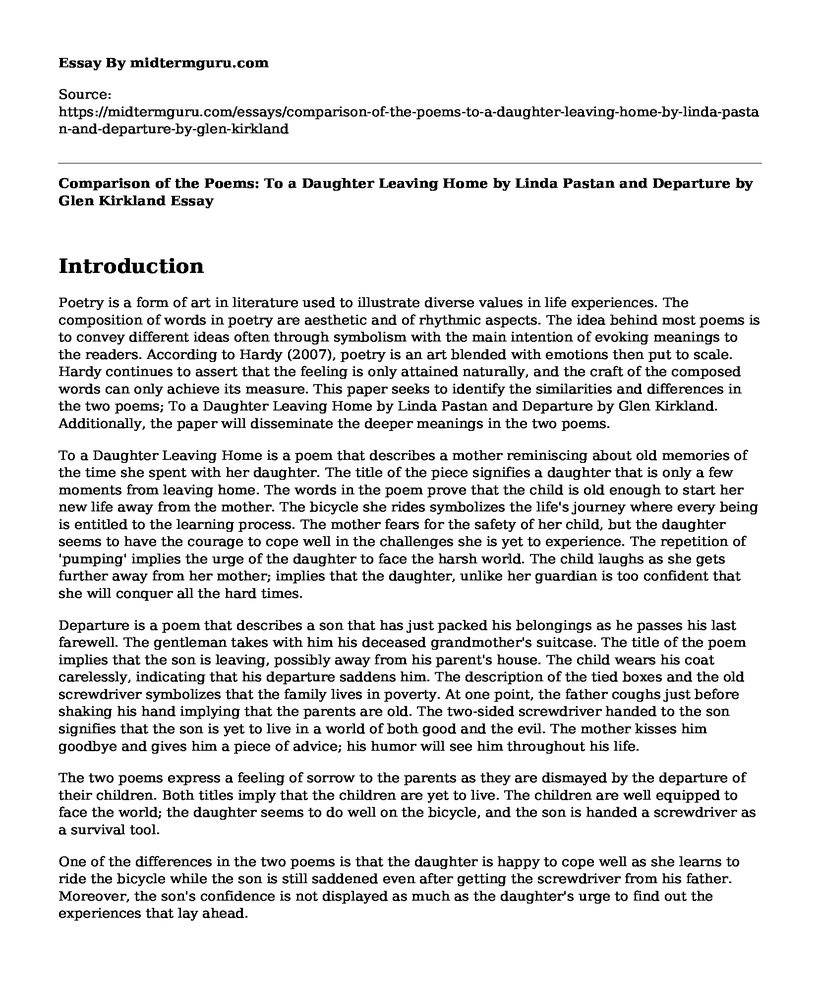Introduction
Poetry is a form of art in literature used to illustrate diverse values in life experiences. The composition of words in poetry are aesthetic and of rhythmic aspects. The idea behind most poems is to convey different ideas often through symbolism with the main intention of evoking meanings to the readers. According to Hardy (2007), poetry is an art blended with emotions then put to scale. Hardy continues to assert that the feeling is only attained naturally, and the craft of the composed words can only achieve its measure. This paper seeks to identify the similarities and differences in the two poems; To a Daughter Leaving Home by Linda Pastan and Departure by Glen Kirkland. Additionally, the paper will disseminate the deeper meanings in the two poems.
To a Daughter Leaving Home is a poem that describes a mother reminiscing about old memories of the time she spent with her daughter. The title of the piece signifies a daughter that is only a few moments from leaving home. The words in the poem prove that the child is old enough to start her new life away from the mother. The bicycle she rides symbolizes the life's journey where every being is entitled to the learning process. The mother fears for the safety of her child, but the daughter seems to have the courage to cope well in the challenges she is yet to experience. The repetition of 'pumping' implies the urge of the daughter to face the harsh world. The child laughs as she gets further away from her mother; implies that the daughter, unlike her guardian is too confident that she will conquer all the hard times.
Departure is a poem that describes a son that has just packed his belongings as he passes his last farewell. The gentleman takes with him his deceased grandmother's suitcase. The title of the poem implies that the son is leaving, possibly away from his parent's house. The child wears his coat carelessly, indicating that his departure saddens him. The description of the tied boxes and the old screwdriver symbolizes that the family lives in poverty. At one point, the father coughs just before shaking his hand implying that the parents are old. The two-sided screwdriver handed to the son signifies that the son is yet to live in a world of both good and the evil. The mother kisses him goodbye and gives him a piece of advice; his humor will see him throughout his life.
The two poems express a feeling of sorrow to the parents as they are dismayed by the departure of their children. Both titles imply that the children are yet to live. The children are well equipped to face the world; the daughter seems to do well on the bicycle, and the son is handed a screwdriver as a survival tool.
One of the differences in the two poems is that the daughter is happy to cope well as she learns to ride the bicycle while the son is still saddened even after getting the screwdriver from his father. Moreover, the son's confidence is not displayed as much as the daughter's urge to find out the experiences that lay ahead.
Conclusion
In conclusion, both poems portray the parents' unhappy moments as their children leave their homes. This paper outlined the meanings of the two poems as well as indicating their differences and similarities.
References
Hardy, T. (2007). Thomas Hardy. Wordsworth Editions.
Cite this page
Comparison of the Poems: To a Daughter Leaving Home by Linda Pastan and Departure by Glen Kirkland. (2022, Sep 21). Retrieved from https://midtermguru.com/essays/comparison-of-the-poems-to-a-daughter-leaving-home-by-linda-pastan-and-departure-by-glen-kirkland
If you are the original author of this essay and no longer wish to have it published on the midtermguru.com website, please click below to request its removal:
- On Living: A Postscript by Stephen King - Literature Essay Example
- Essay on Time Stands Still By Donald Marguiles
- Literature Essay on Winter's Bone by Daniel Woodrell
- The Sirens in Odysseus - Literary Analysis Essay
- Literary Analysis Essay on "Punished by Rewards" by Alfie Kohn
- Paper Example on Symbols in Edgar Allan Poe's "The Cask of Amontillado"
- Critical Essay on Gender Roles in the Great Gatsby







